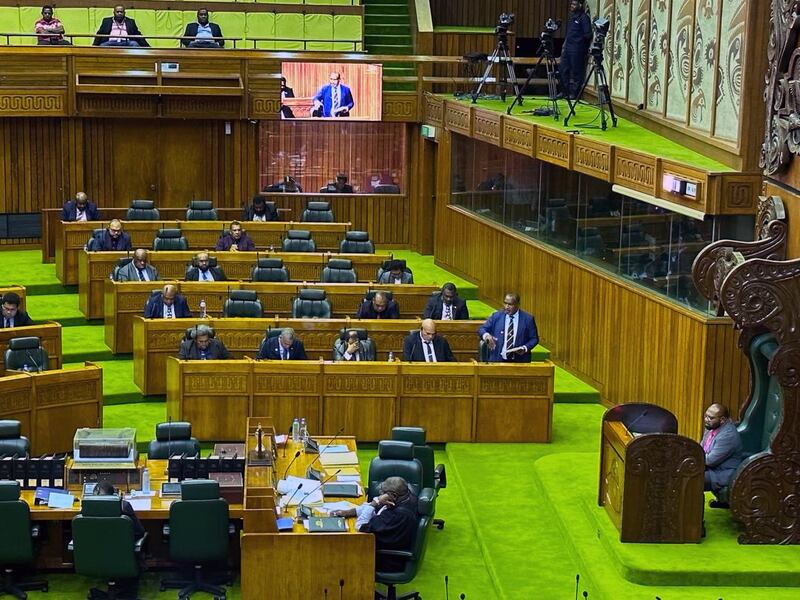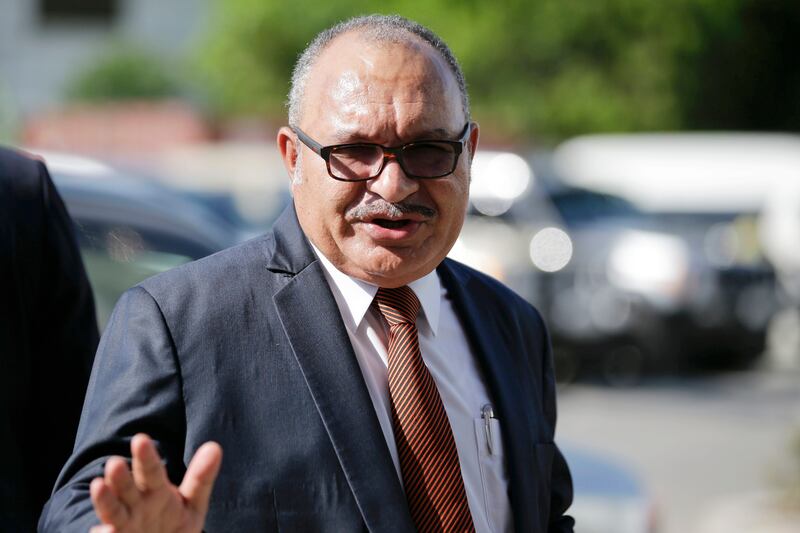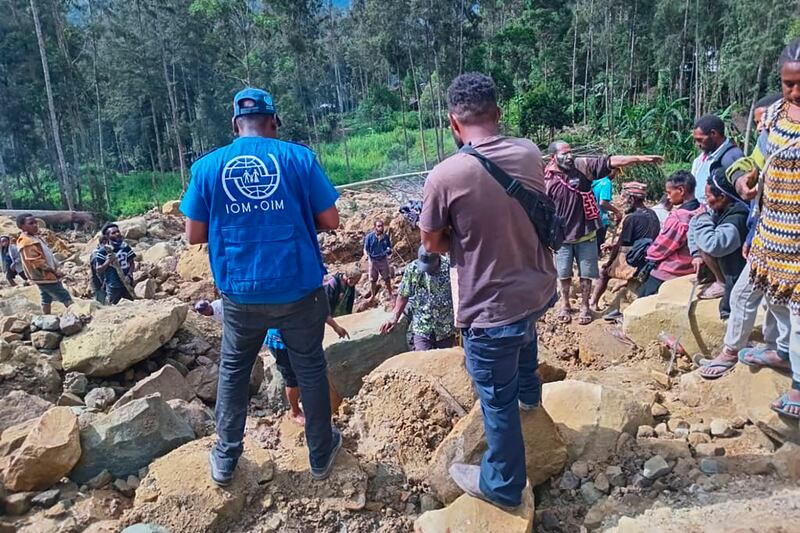Exactly five years after Papua New Guinea’s then newly elected prime minister pledged to make it the “richest black Christian nation on Earth,” James Marape on Thursday defended his government’s performance in the face of a possible parliamentary no-confidence vote.
Delivering his annual State of the Nation address, Marape said “the economy had turned the corner” as he declared progress in the health, education and infrastructure sectors.
“It has been five years today. Some say that there have been no achievements. But I beg to differ,” Marape said, adding the economy had recorded a half decade of growth.
Despite his claim, the World Bank earlier this month forecast that the Pacific island nation would have slower-than-projected medium-term growth of 3%. The bank pointed to concerns about declines in commodity prices, impacts from climate change and a recent riot.
Widespread rioting and looting exploded in the capital in January, sparked by protests from police and other public servants being underpaid their wages. More than 20 people died and major businesses in Port Moresby were burned to the ground, causing damage estimated at more than 1 billion kina (U.S. $259.6 million).
Marape also addressed the nation in the wake of a landslide that killed hundreds of people in Enga province.
"Obviously the cost of living, levels of dissatisfaction, [and] the January 10th scenario was a bit extraordinary. It certainly highlighted the level of youth and urban settlement disillusionment and frustration," Paul Barker, director of the Institute of National Affairs, a privately funded think-tank in Port Moresby, told BenarNews.
MPs defect
Mounting discontent in government ranks saw 18 MPs defect from the ruling bloc to the opposition last week, causing analysts to speculate about a brewing no-confidence vote against Marape, 53. Among those leaving Marape’s Pangu Parti were Rainbo Paita, who served as finance minister and has been nominated as the alternate prime minister.
Having survived a confidence vote in 2019 after taking office, the party won the largest number of seats in the 2022 general election, but international observers criticized the polls as one of the worst on record.
A committee next week is expected to consider a motion on a new confidence vote.
“This government is not lost, we have the numbers. Fear not, worry not, remain in PNG, focus on investing in PNG,” Marape told a press conference after his speech.

Ahead of Marape’s speech, Allan Bird, an opposition leader and governor of East Sepik province, told MPs that an average day’s pay was 28 kina (U.S. $7.28).
Holding a can of tuna and bag of rice, Bird said the cost of basic stables had increased by 50% in the past five years, making two meals a day barely affordable as pay had remained virtually the same.
Acknowledging Bird, Marape said “families are struggling to put food on the table, I’m admitting this.
“From available information, living standards today are 38% lower than at Independence. Anyone would be unhappy with that,” he said while ensuring citizens their lives would improve.
The nation achieved its independence from Australia, its next-door southern neighbor, in 1975.
Marape said he “inherited an economy that was poorly managed” in 2019, but did not mention that he served as finance minister under Peter O’Neill, the prime minister he ousted.
O’Neill, who serves as an MP, responded by blasting Marape. He called on the PM to not blame the country’s problems on people who couldn’t defend themselves.
“It’s a statement not worthy from the office of the prime minister who has become a serial liar, it was grandstanding in an attempt to protect himself from being voted out. Plainly shameful display of desperation to hold onto power,” O’Neill told BenarNews.

During his speech, Marape likened the country to a ship, which he dubbed the “MV PNG.”
Marape said it was “a long, long way from its destination,” but heading in the “right economic direction,” despite external factors. He cited the war in Ukraine, the COVID-19 pandemic, international inflationary pressures and domestic currency issues.
He pointed to five years of growth in agriculture, a sector which 80% to 90% of the population relies on for their incomes.
In addition, with the Porgera gold mine expected to resume production, he forecast that cuts in budget deficits would accelerate.
Marape assured Papua New Guineans that final contract negotiations for the mine – a joint venture with Canada and China – were underway to resume production following a government shutdown in 2020. He also said talks were underway for a 20-year extension of the Ok Tedi gold mine.
Australian support
Australia is Papua New Guinea’s largest single aid donor, to the tune of A$637 million (U.S. $422.9 million). In December, Canberra provided a A$600 million (U.S. $398.8 million) budget support loan, the day after the two countries signed a defense cooperation agreement.
Australia and the United States both recently signed security cooperation agreements with Papua New Guinea, in response to China's inroads with Pacific island nations.
While Australia is Papua New Guinea’s biggest trading partner, China is second.
“China relates very well with us, the United States relates very well with us, Australia as usual, forever a very strong supporter. Our international relations could not be better,” Marape said.
After changes at the central bank, including the appointment earlier this year of Elizabeth Genia as the first woman governor, and with reserves of U.S. $3.95 billion, Marape said he hoped the country’s foreign exchange shortages would end by 2027.
Domestically, the prime minister said the nation saw 5% growth in rural jobs, noting that thousands of government-sector workers had been employed in those areas.
Marape cited the establishment of the Independent Commission Against Corruption as a major achievement, adding he hoped “there will be some prosecutions by this time next year.”
In July 2019, only a month after he took office, 22 people including pregnant women and children were killed in a massacre in Marape’s Highlands electorate.
At the time, the newly elevated Marape called it the “saddest day of his life” and warned the perpetrators “I’m coming for you.”
In his speech Thursday, Marape hailed a jump in police recruitment numbers, saying these were on track to lift the force from 6,000 to 10,000 by 2030. The violence, however, has continued unabated.

The Prime Minister also addressed the mounting costs of natural disasters in light of last week's massive landslide in Enga.
Previously, Marape said natural disasters had cost the country over 500 million kina (U.S. $129.8 million) this year before the landslide struck.
But he made little mention of climate change. And the vexed question of parliament's consideration of the autonomous region of Bougainville's independence referendum result looming before parliament was only briefly mentioned.
“You wouldn't say that he was doing a lot in terms of leadership,” Barker, the analyst, said, referring to Marape’s record on climate change.
“Some of the other smaller island nations like Vanuatu, they’re very much more at the fore on many of those issues, the blue-green economy,” Barker said.
